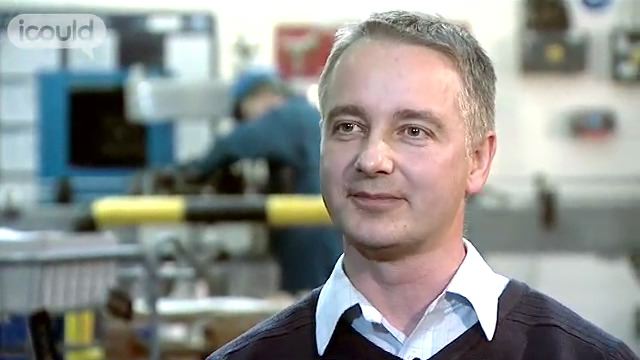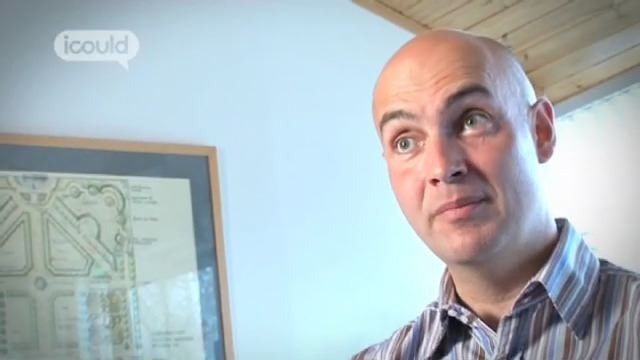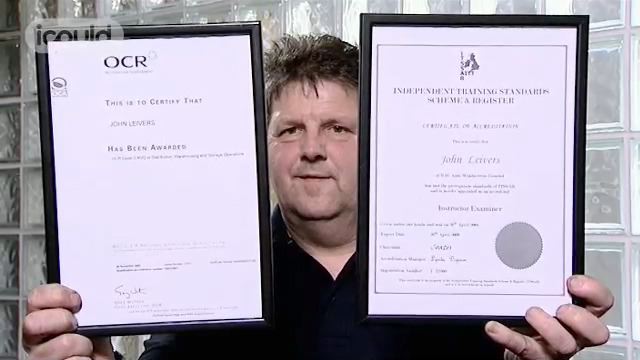Plant Scheduler
PPG Industries
Tony S
I’m Tony S, and my role at the moment is a plant scheduler. The main role of the job is to make sure that when a customer wants the paint there’s paint there available for him, and to do this we work mostly on computers and we use a lot of tools such as Forecast, and with that we try and see what the customer is going to order in the future. As long as the forecast is fairly accurate then we make sure that the customer has got what he wants, when he wants it.
00:00:25 I’ve been working for the company now since I was sixteen, so that’s twenty-three years. When I left school I didn’t really know what I wanted to do, so I was fortunate enough to get this job, and you spent four to six weeks in different areas so you got to see what the jobs were like, if you enjoyed them, and whether at the end of the two years you wanted to go back and try and get that job, and also the people who you were working with got to see what you were like and did they want you in that department?
00:00:57 The first job I had was in the production area, and that was actually filling the paint, the second job I had was actually making the paint, and the third job was making it and testing it as well. Now, this was about six or seven years into my career, and after that then the opportunity arose to work within the supply chain in the role that I do now. I could see other jobs were going to arise for me. As long as I did a good job in what I was doing, the potential was there and that would be seen by my managers. I suppose when I was younger everybody dreams of being something exciting like an airline pilot, but, you know, that was just one of the dreams that you have when you’re a child.
00:01:36 When I was at school I was probably what you would call an average student. All my grades were average. I wasn’t exceptional at anything. Probably the problem with that was that I never had any focus on exactly what I wanted to do. Had I known exactly what job I wanted then I could have focused in on that and got the qualifications I needed. So it got to the end of my school career and then I said ‘Well, do I go out and get a job, or do I stay at school?’ Fortunately, I got the job instead.
00:02:06 The people who stayed at school were obviously envious of the ones that had gone out to work and they’d got money coming in, and when you’re sixteen/seventeen you want to get yourself a car, a motorbike, and then perhaps get a house quite soon after that. Obviously, the ones staying on and going to college didn’t have that money to do that with, but then obviously in the longer run they got better qualifications and I’m sure now they’re earning a lot of money.
00:02:30 I lost my dad a few years ago and I lost my two grandmothers within a short period of time after that. When things like that happen to you in life it really makes you step back a bit and look to see what’s important. Everybody knows that their family life is important to them. Now, obviously your job is a very important part of your life, but it’s striking that balance between the two. Somebody once said to me that they had a job and they sat there watching the clock all day long because it was so boring, and I said to myself there’s no way I’m going to get a job like that. I need something that keeps me stimulated.
00:03:03 Yes, when I was at school I had the chance to do the Duke of Edinburgh scheme. I would say it’s a very good experience and it opens doors to things that perhaps you’ll never experience in life. I’m not really an outdoor person, but we went camping, and we did expeditions and map reading, which were fantastic and I look back on it now and I’m so pleased that I did it because I probably wouldn’t do it otherwise. I’m happy in the job that I’m doing, and as long as that keeps evolving and the job keeps changing then I’m happy doing what I’m doing now. But if I get to a point and it becomes stale, and I start watching the clock and thinking ‘Oh, when is the day going to end,’ then I know that it’s time to move on and try to do something different. ENDS.
In his 23 years with the company, Tony S has made the most of his chances. Working his way through different departments he is now a Plant Scheduler. Tony uses IT forecasting tools to ensure the company’s product is available for customers when they want it. His role has constantly evolved and this is important to him as he is determined not to settle for a boring work life. He values his family and his work life balance.
More information about Engineering project managers and project engineers
The UK average salary is £29,813
There are 37.5 hours in the average working week
The UK workforce is 47% female and 53% male
Future employment
- Draws up budgets and timescales for new engineering projects based on clients’ requirements
- Briefs project team, contractors and suppliers
- Assembles information for invoicing at the end of projects
- Plans work schedules for engineering projects based on prior discussion with client and contractors
- Regularly inspects and monitors progress and quality of work, ensures legal requirements are met
- Identifies defects in work and proposes corrections
- Records, monitors and reports progress
- Ensures that equipment, operation and maintenance comply with design specifications and safety standards



